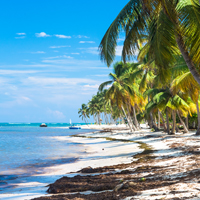Moving to Samana, the Dominican Republic
Last updated on Nov 03, 2024
Summary: Moving to Samana, Dominican Rep? Expats talk about what you need to know before moving to Samana.
What do I need to know before moving to Samana?
When we asked people what advice they would give someone preparing to move to Samana, they said:
"Samana, located in the northeastern part of the Dominican Republic, is known for its beautiful beaches, lush mountains, and vibrant culture. Before moving to Samana, expats should be aware of several important factors. Firstly, the official language in Samana is Spanish, so it would be beneficial to learn the language or at least some basic phrases. English is spoken in tourist areas, but not widely elsewhere. The cost of living in Samana is relatively low compared to many Western countries. However, expats should be aware that imported goods can be expensive due to import taxes. Healthcare facilities in Samana are adequate for minor health issues, but for serious conditions, you may need to travel to the capital, Santo Domingo. It's recommended to have a comprehensive health insurance that covers medical evacuation. The Dominican Republic has a tropical climate, with high temperatures and humidity throughout the year. Samana, in particular, experiences heavy rainfall during the hurricane season from June to November. Public transportation in Samana is not very reliable or comfortable. Most expats choose to rent or buy a car for convenience. However, driving in the Dominican Republic can be challenging due to different driving habits and poorly maintained roads. The Dominican Republic is generally safe, but petty crime like pickpocketing and bag snatching can occur. Expats are advised to take standard precautions to protect their personal belongings. The food in Samana is a blend of Spanish, African, and Taino influences. The local cuisine is based on rice, beans, and meat, with plenty of fresh seafood and tropical fruits. The Dominican Republic has a different electrical system than North America and many European countries. The standard voltage is 110 V and the frequency is 60 Hz, so you may need a voltage converter or adapter for your devices. Lastly, the Dominican people are known for their friendliness and hospitality. However, they also value respect and good manners, so it's important to be polite and respectful in all interactions," replied a member in Samana.
How do I find a place to live in Samana?
We asked expats how they chose their neighborhood and found a place to live. They answered:
"Finding a place to live in Samana, Dominican Republic involves several steps. First, you need to determine your budget and the type of accommodation you're looking for. This could range from a small apartment to a large villa. Next, you should research the different neighborhoods in Samana to find one that suits your lifestyle and preferences. Some popular areas include Las Terrenas, Santa Barbara de Samana, and Las Galeras. Once you have a general idea of where you'd like to live, you can start your search for specific properties. There are several online real estate platforms that list properties for rent or sale in Samana, such as Point2Homes, Realtor.com, and Century 21. You can also hire a local real estate agent to help you in your search. They can provide valuable insight into the local market, help negotiate prices, and guide you through the legal process of renting or buying property in the Dominican Republic. When you find a property you're interested in, it's important to visit it in person before making a decision. This will give you a chance to inspect the property, meet the neighbors, and get a feel for the local community. Finally, once you've found your ideal home, you'll need to sign a lease or purchase agreement. Make sure to read the contract carefully and consult with a lawyer if necessary to ensure you understand all the terms and conditions. Remember, moving to a new country can be a complex process, so it's important to take your time and do thorough research to ensure you find the perfect home in Samana," said one expat in Samana.
What is a typical expat home or apartment like in Samana?
"A typical expat home or apartment in Samana, Dominican Republic, is often located in a gated community or a secure building, providing a safe and comfortable living environment. These homes are usually spacious, with multiple bedrooms and bathrooms, a fully equipped kitchen, and a living room. They often come furnished, featuring a blend of modern and traditional Dominican decor. Many homes also have a balcony or a patio, offering stunning views of the surrounding landscapes, which may include the ocean, mountains, or lush tropical gardens. Some properties even have private pools or access to a community pool. Additionally, these homes often come with amenities like air conditioning, high-speed internet, and cable TV. They are usually located close to local shops, restaurants, and beaches, providing expats with easy access to daily necessities and leisure activities," said one expat in Samana.
What is the average cost of housing in Samana?
If you are thinking about moving to Samana, cost of living in probably a key consideration. Expats commented about the cost of housing:
"The average cost of housing in Samana, Dominican Republic can vary greatly depending on the location and type of property. For instance, a luxury villa in a prime location can cost significantly more than a modest apartment in a less popular area. However, on average, you can expect to pay a moderate amount for a decent property in Samana. It's also worth noting that property prices can fluctuate due to factors such as market trends and the overall state of the economy," remarked one expat who made the move to Samana.
Should I buy or rent a home in Samana?
If you have not spent a lot of time in Samana, you should rent before even thinking about buying. We asked expats there about the buy vs. rent decision:
"The decision to buy or rent a home in Samana, Dominican Republic, largely depends on your personal circumstances, financial situation, and long-term plans. If you plan to stay in Samana for a long period or frequently visit, buying a home could be a good investment. Owning a property allows you to have a permanent base, gives you the freedom to make changes to the property, and could potentially provide rental income if you choose to rent it out when you're not there. On the other hand, renting a home in Samana could be a more flexible and less financially burdensome option, especially if you're not planning to stay long-term. Renting allows you to move freely without the commitment of a mortgage. It also means you're not responsible for property maintenance and other costs associated with homeownership. However, it's important to consider the local real estate market, cost of living, and legal requirements for foreign property owners in the Dominican Republic. It's recommended to seek advice from real estate professionals or legal advisors before making a decision. In conclusion, whether to buy or rent a home in Samana depends on your individual circumstances and needs. It's crucial to do thorough research and consider all factors before making a decision," remarked one expat who made the move to Samana.
What should I pack when moving to Samana?
We asked people living in Samana to list three things they wish they had brought and three they wish they had left behind. They responded:
"When moving to Samana, Dominican Republic, you should pack lightweight clothing due to the tropical climate. Include items such as shorts, t-shirts, and sundresses. Don't forget to pack a few swimsuits for the beach and pool. A light jacket or sweater is also recommended for cooler evenings. Pack plenty of sun protection items such as sunscreen, sunglasses, and a wide-brimmed hat. You should also pack insect repellent to protect against mosquitoes. Comfortable walking shoes are a must, as well as sandals or flip-flops for the beach. If you plan on hiking or exploring, consider packing a pair of sturdy hiking boots. Bring all necessary toiletries, but keep in mind that many items can be purchased locally. If you have specific brands or products you prefer, it may be best to bring them with you. Don't forget to pack any necessary medications, along with copies of your prescriptions. It's also a good idea to bring a basic first aid kit. Pack a power adapter for your electronics, as the Dominican Republic uses a different plug type and voltage than many other countries. Bring important documents such as your passport, driver's license, and any necessary visas or permits. It's also a good idea to have copies of these documents in case they get lost or stolen. If you plan on cooking or preparing meals, consider packing some of your favorite non-perishable food items, as they may not be available locally. Lastly, pack items that will help you feel at home in your new surroundings, such as photos, favorite books, or small keepsakes," said one expat in Samana.
 InsideDR Concierge
InsideDR ConciergeGet Quote
Because we've done it and we understand what it’s like to move to the Dominican Republic, our goal is to ensure that you and your family feel secure and supported throughout this new adventure. We’re here to welcome and guide you every step of the way.
 InsideDR Concierge
InsideDR ConciergeBecause we've done it and we understand what it’s like to move to the Dominican Republic, our goal is to ensure that you and your family feel secure and supported throughout this new adventure. We’re here to welcome and guide you every step of the way.
Get Quote
What cultural faux pas should I try to avoid making in Samana?
We asked people in Samana if they could share any humorous cultural blunders they commited. For new expats, keep in mind that these incidents are an inevitable part of expat life. Learning to laugh about them is the key!:
"When visiting Samana in the Dominican Republic, it's important to respect the local customs and traditions. Avoid wearing revealing clothing, especially in religious or formal settings, as it is considered disrespectful. Do not take photos of locals without their permission, as it is considered rude and invasive. Avoid making negative comments about the country or its people, as Dominicans are very proud of their heritage and culture. Do not refuse food or drink offered to you, as it is considered impolite. Avoid discussing sensitive topics such as politics, religion, or personal finances, as these subjects can be considered inappropriate or offensive. Do not litter or disrespect the environment, as Dominicans take pride in their beautiful natural landscapes. Avoid being overly loud or disruptive, as it is considered disrespectful. Do not expect punctuality for social events, as the Dominican culture operates on 'island time' and it is common for events to start later than scheduled. Avoid public displays of affection, as they are considered inappropriate in Dominican culture. Do not assume everyone speaks English, as Spanish is the official language of the Dominican Republic. Avoid aggressive bargaining in markets, as it is considered disrespectful. Do not ignore local customs and traditions, as it is important to show respect for the local culture," said one expat who made the move to Samana.
About the Author
 Betsy Burlingame is the Founder and President of Expat Exchange and is one of the Founders of Digital Nomad Exchange. She launched Expat Exchange in 1997 as her Master's thesis project at NYU. Prior to Expat Exchange, Betsy worked at AT&T in International
and Mass Market Marketing. She graduated from Ohio Wesleyan University
with a BA in International Business and German.
Betsy Burlingame is the Founder and President of Expat Exchange and is one of the Founders of Digital Nomad Exchange. She launched Expat Exchange in 1997 as her Master's thesis project at NYU. Prior to Expat Exchange, Betsy worked at AT&T in International
and Mass Market Marketing. She graduated from Ohio Wesleyan University
with a BA in International Business and German.
Some of Betsy's articles include 12 Best Places to Live in Portugal, 7 Best Places to Live in Panama and 12 Things to Know Before Moving to the Dominican Republic. Betsy loves to travel and spend time with her family. Connect with Betsy on LinkedIn.
Other Questions:
- What do I need to know before moving to Samana?
- What is a typical expat home or apartment like in Samana?
- What is the average cost of housing in Samana?
- How do I meet people in Samana?
- What do I need to know before retiring in Samana?
- What should I pack when moving to Samana?
- Where should I setup a bank account in Samana?
- Will I be able to find a job in Samana?
- What is life like as an expat in your area?
- What do people like (and dislike) about Samana?
- What type of social life can someone expect in Samana?
- What is the social scene like in Samana?
- What advice to expats in Samana have about housing?
- What are medical services in Samana like?
- Are healthcare and health insurance expensive in Samana?
- Is the cost of living in Samana high?
- What are the visa & residency requirements in Samana?
- Why do people move to Samana?




